Why AI Is the Most Important Issue in the Writers' Strike
Artificial intelligence isn't just central to the WGA strike either — it's the first battle in a much larger war that will affect all Americans
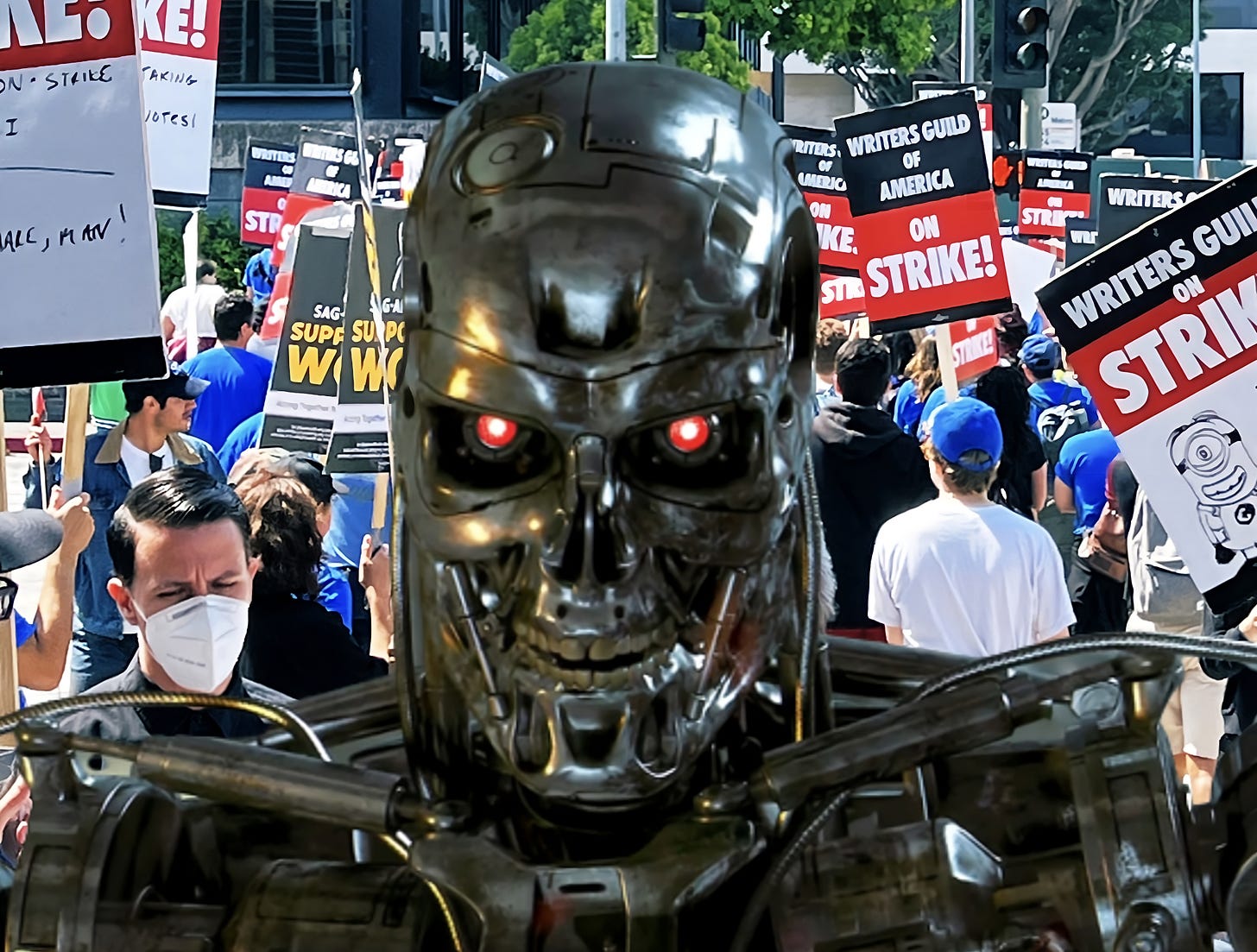
“It was a reality check of, like, oh my God, this is fifty times worse than 2007,” Writers Guild of America West Board of Directors member Deric A. Hughes told me over the phone this week about the moment he realized how serious the threat of artificial intelligence was to our union. “Because it could destroy the Guild. Not even destroy it – just eliminate the Guild as we know it in three years’ time.”
At present, the WGA is more than one week into a strike — its first since 2007 — following a breakdown in contract negotiations with the Alliance of Motion Picture and Television Producers (AMPTP). Guild leadership has described this as an existential fight, which one might assume is only about pay cuts, dwindling residuals, and the proliferation of mini-rooms that have reduced much of the scriptwriting business to gig work despite healthy corporate profits and record CEO paydays. After all, these things determine a writer's ability to live, build a career, and, therefore, life for themselves. But as it turns out, the existential threat is much more terrifying than many might realize judging by how the AMPTP greeted the Guild’s demands to limit the use of AI in our industry — and it has implications for industries across America and the globe.
The first time the WGA’s negotiating committee brought AI up to the AMPTP, the AMPTP’s team feigned ignorance about it, claiming they didn’t yet understand it. This is something Hughes — who most recently wrote on the “QUANTUM LEAP” reboot — was quick to point out to me they also did back in 2007 during the lead-up to the last strike, constantly pretending as if they didn’t understand the potential of this strange thing called the Internet to completely alter the film and TV industry — a disingenuous position as evidenced by the fact that Hulu was announced the day after the 100-day-long strike ended. When the WGA negotiating committee raised the issue of AI again, the stonewalling persisted; the AMPTP outright refused to discuss the subject. The last time AI was discussed before the strike was called, they relented at last.
In an email exchange with me, Patric M. Verrone, former WGAW president and member of the current negotiating committee, described this conversation with AMPTP president Carol Lombardini: “When [she] was finally willing to talk about AI, she said that the studios were unwilling to disadvantage themselves with a technology that they knew they intended to use.” This statement shocked the negotiating committee because, he added, “She said the quiet part out loud.”
The AMPTP instead offered the WGA yearly conferences to discuss the subject more rather than any type of immediate controls. Judging by the online reaction from membership to this news, it was received as an insult, which it’s difficult to believe was not the AMPTP’s intention.
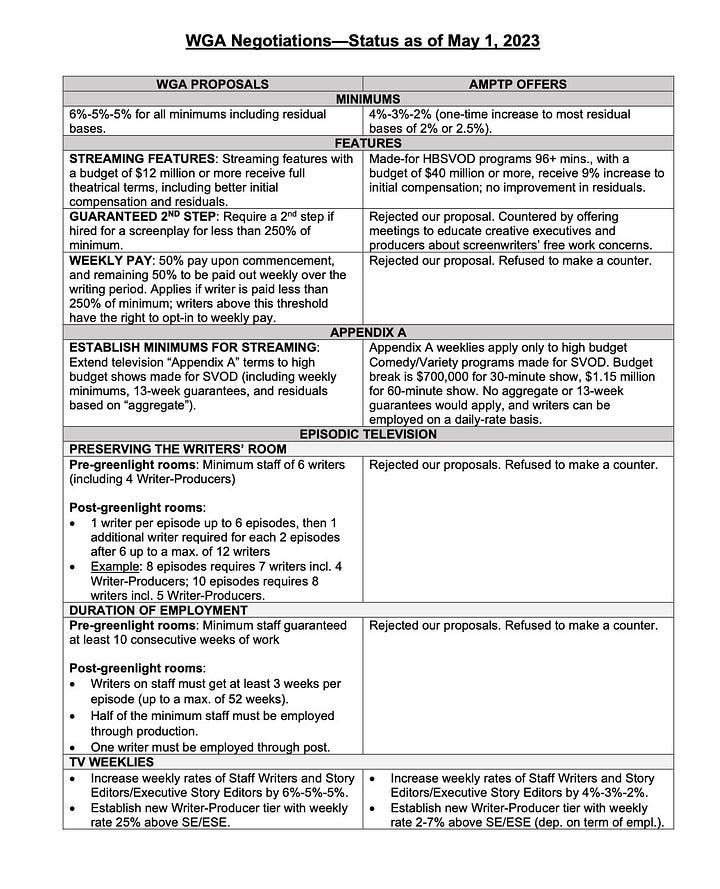
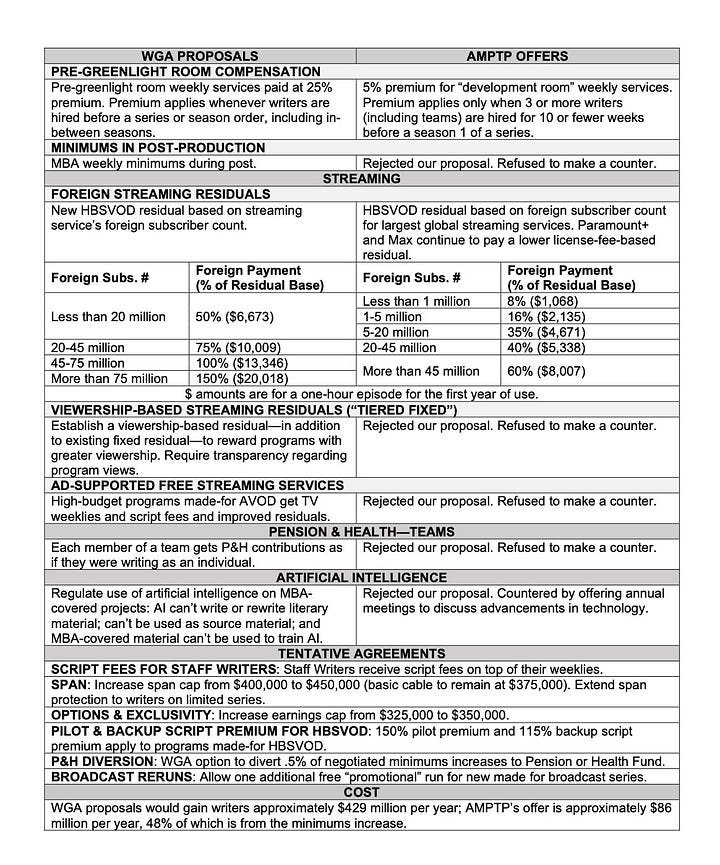
“GAME OVER, MAN, GAME OVER!”
Hughes was the harbinger of doom within the Guild. Back in August of 2022, a casual encounter with Midjourney, a generative AI program, tingled his Spidey-sense. “The prompt was: Hawaiian man, standing alone on a sandy shore looking out at the waves underneath the starry night,” he told me. This was the result:
He turned to some concept artist friends of his for context, and they explained how work was already drying up for them. The big contracts remained (for now), but smaller jobs were quickly going to Midjourney and similar, a situation that became especially infuriating when the artists discovered their own work was being used and manipulated by these AI programs. This is because AI — as artists currently discuss it — is not genuinely artificial intelligence. It’s not sentient and it’s still far from Skynet. Instead, it’s what’s called a “large language model”. All it can do is take your prompts, pillage public domain and copyrighted material from across the Internet, and then piece it together in what appears to be original ways but is, in fact, wide-scale theft.
As Hughes calls them: plagiarism machines.
At this point, he looped in WGAW President Meredith Stiehm and the AI Working Group was quickly formed, comprised of other Board members and screen and television writers, to explore the issue further. Remember, this wasn’t even half a year ago. Things moved quickly, and, as internal concern began to mount, Midjourney continued to evolve.
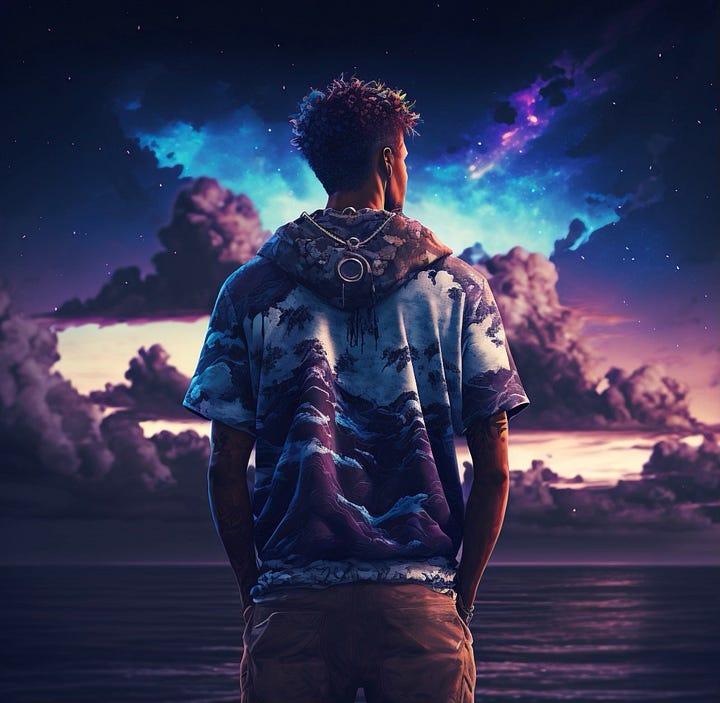

Then, ChatGPT joined the conversation.
WGAW member Kim Shumway (“PARTNER TRACK”), who sat on the AI Working Group, emailed with me about this period. “When CLARKESWORLD MAGAZINE closed submissions due to a deluge of AI-generated stories in February, it became clear that the threat was immediate,” she wrote. “It proved that people were actively using AI to generate material to make money, which has obvious implications for Hollywood writers.” Less than three months after ChatGPT launched, short story magazines were being inundated with AI-generated material. “That cemented that we'd need to deal with AI now because three years from now would be too late.”
It had become clear AI wasn’t going to remain a tool some might use to tell their stories, but could be exploited by producers or studios and streamers to replace writers altogether. The best-case scenario was we would be reduced to punch-up writers whose sole purpose was to take AI-generated scripts and fix all those nagging creative oddities that amount to what is known as “the uncanny valley”.
The uncanny valley describes the unsettling relationship between the human-like appearance of an artificial object and the emotional response it provokes, previously principally applied to computer-generated images and robots. In literature, the effect is just as disconcerting given AI’s persistent inability to simulate what, for all intents and purposes, is “the human soul”. It’s pure simulacra, a simulation of something that didn’t exist in the first place, which is what happens when you broadly mine pop culture and repurpose all that art without understanding what went into its creation in the first place.
We’re now getting into the realm of philosophers such as Jean Baudrillard, whose work on how we experience reality influenced the Wachowskis’ as they wrote THE MATRIX. Because of this, I turned to one of the most existential screenwriters I personally know — Damon Lindelof, co-creator of “MRS. DAVIS” (which concerns an omnipotent AI program).
Lindelof described AI as a shortcut for those in our profession. “It’s a handful of caffeine pills the night before a test,” he said. “It’s a velociraptor in JURASSIC PARK. It’s something that seems like a good idea, but will deteriorate the painstaking process by which we strive to make something feel authentic — because AI’s do not feel. They plagiarize and synthesize feeling.”
This brings us back to what Hughes was talking about when he described realizing that AI posed a threat to the WGA that was exponentially worse than the one that prompted its membership to strike back in 2007. Without immediate curbs to prevent producers from banishing writers from the creative process and replacing them with studio-funded chatbots, the Guild’s membership would soon find themselves almost entirely replaced by digital plagiarists.
And for good.
“EXPLAIN IT LIKE I’M EIGHT.”
Billy Ray, the Oscar-nominated writer of CAPTAIN PHILLIPS — as well as a former WGAW Board member — walked me through what this means in practical terms for writers:
It's the nature of a corporation to seek to depress costs and raise profits. In that pursuit, which is maximum efficiency — or what they call in Silicon Valley “optimization” — there can be steps left out and people left behind. In the same way that banks used to have tellers and now have ATMs and gas stations used to have gas station attendants and now we use our credit cards to pump. All the same story.
So, what it's going to yield in our business is a new definition of optimization. Which will be, for example, I sell a show to a streamer. That streamer puts me in a room with two writers for ten weeks to break eight episodes that pay the writers minimum. Then, the streamer decides to green light show, but they get rid of the other two writers. They put me in a room with AI instead, and AI generates eight crappy scripts. Then I come back in and rewrite the AI, which I'm desperate to do because it’s my show. The streamer then gets eight scripts by me at an absolute minimum cost.
I can't protect the two writers that started in the room with me, so they've been paid minimum for ten weeks, then they're back in the job force again, fighting with every other writer for what's left out there. [Consequently], what you have is fewer writers making less money, therefore making less contribution to the pension and health plan, which eventually will completely evaporate. Then you won't be able to make a living as a writer, because no one's making enough money and no one can afford to live without the health insurance that was once provided by the health plan.
So, people will leave the business and the Guild will fold.
At this point, I asked Ray if he agreed with Hughes’s concern that unchecked AI could mean the end of the WGA by the time the next contract negotiations roll around in 2026. “I don’t know if it will be three years,” he said, “but certainly ten.”
COMING SOON: MALCOLM X STARRING TOM HANKS
If you’re a fan of dramatic irony, consider this: the studios and streamers’ interest in cutting costs by replacing writers with AI would ultimately put the studios and streamers out of business. Such optimization, the compulsive need to drive maximize profits today rather than invest in an enduring long-term business model, is unsustainable in this situation. It’s the ouroboros, the self-devouring serpent, but for real and playing out in front of our eyes in real-time.
“Potentially, what you could do with [AI] is obviously use it to engineer storytelling and change storytelling,” AVENGERS director Joe Russo told Collider recently. “So, you have a constantly evolving story, either in a game or in a movie or a TV show. You could walk into your house and save the AI on your streaming platform. ‘Hey, I want a movie starring my photo-real avatar and Marilyn Monroe’s photo-real avatar. I want it to be a rom-com because I’ve had a rough day,’ and it renders a very competent story with dialogue that mimics your voice. It mimics your voice, and suddenly now you have a rom-com starring you that’s 90 minutes long. So, you can curate your story specifically to you.”
Hughes offered his own prompts for a film nobody should want to see, but one day very soon might: “Hey, tonight I want to watch MALCOLM X starring a de-aged Tom Hanks as Malcolm X, but he isn’t fighting injustices against Black people. He’s fighting injustices against white people. And I want it shot and directed in the style of Steven Spielberg.”
Because there are no laws yet against how these AI programs work, or the information it steals from online — including actor’s images and voices — this means that, if Russo’s timeline proves remotely accurate, in two or so years the creepy dude next door who can’t stop staring at you can prompt one of these moviemaking programs to mine your social media account. Voila, you’re now a co-star in his own personal DEEP THROAT – and there’s nothing you’ll be able to do about it.
The hope is that legislation would quickly arrive to intervene, but have you seen Washington, DC lately? As Labor writer
wrote this week here on Substack, “It is foolish to believe that the US government is going to pass adequate regulations of AI or produce an adequate social safety net in time to prevent awful social consequences of vast swaths of workers who suddenly find themselves replaced by AI.”That leaves it up to the courts, which will have no choice but to contend with this situation very soon since Getty Images is suing Stability AI, alleging that the company copied some 12 million of its copyrighted images to train its AI model “without permission ... or compensation … as part of its efforts to build a competing business." In this case, deep cyber forensics wasn't even necessary to identify the alleged theft. Stability AI-produced images still bore Getty's infamous water stamp that is used to prevent the rest of us from stealing its property.
Here’s another example of this: nine images created by Lensa’s generative AI. Each reveals the signatures of the artists who created the work that was stolen and warped by the AI without even bothering to excise evidence of the creative robbery.
As mind-boggling as this might be, a court decision preventing studios and streamers from using AI to generate stories would save the US film/TV industry from self-destruction. Because, again, AI cannot create by itself, it cannot innovate, it cannot do anything more than scrape the Internet for other people’s work, stitch it together, and pass it off as its own. This means that if it’s been fed both copyright-protected and public-domain content, it cannot distinguish between the two. In other words, its output is not eligible for copyright protection. An AI software program such as ChatGPT can’t sign a certificate of authorship either. Hollywood would become public domain generators, unable to protect its own product from plagiarism…hence, the ouroboros description I offered earlier.
In Billy Ray’s mind, this is why the WGA is really striking. “These CEOs will have destroyed the economic engine that actually created all that wealth in the first place,” he told me. “And so, in that sense, we’re trying to save the business from the people who own it.”
SIMULACRA, SIMULATION, AND THE DEMISE OF ART
There is so much to be concerned about when it comes to AI — and I’ll come back to its threat to the WGA in a moment — but, when I put aside my personal need to create, my desire to tell stories with the moving image, what scares me most about the possibilities Hughes and others have now described is this: a near-future where films and TV series are entirely produced by unthinking large language models, custom-made for individuals whose only goal is to drug themselves with whatever frivolity or depravity they momentarily desire.
Art has always been a mirror for human beings, to show us who we are, to help us understand the world around us, to communicate our hopes and fears and dreams. When it ceases to adapt to our times, when it no longer reflects reality, when mimicry and parody and mockery are all that remain, AI will have no choice but to begin to feed upon itself. It will reproduce from its own perversions of human life and imagination. It will confuse us and reduce us.
“Our business is already accused of having no new ideas, of relying on prequels and sequels and adaptations of pre-existing IP, and now we’re enlisting a tool that is powered by an engine of stories already written,” Damon Lindelof told me. He added, rather ominously, “The rise of AI is the fall of original ideas.”
In so many ways, this feels inevitable.
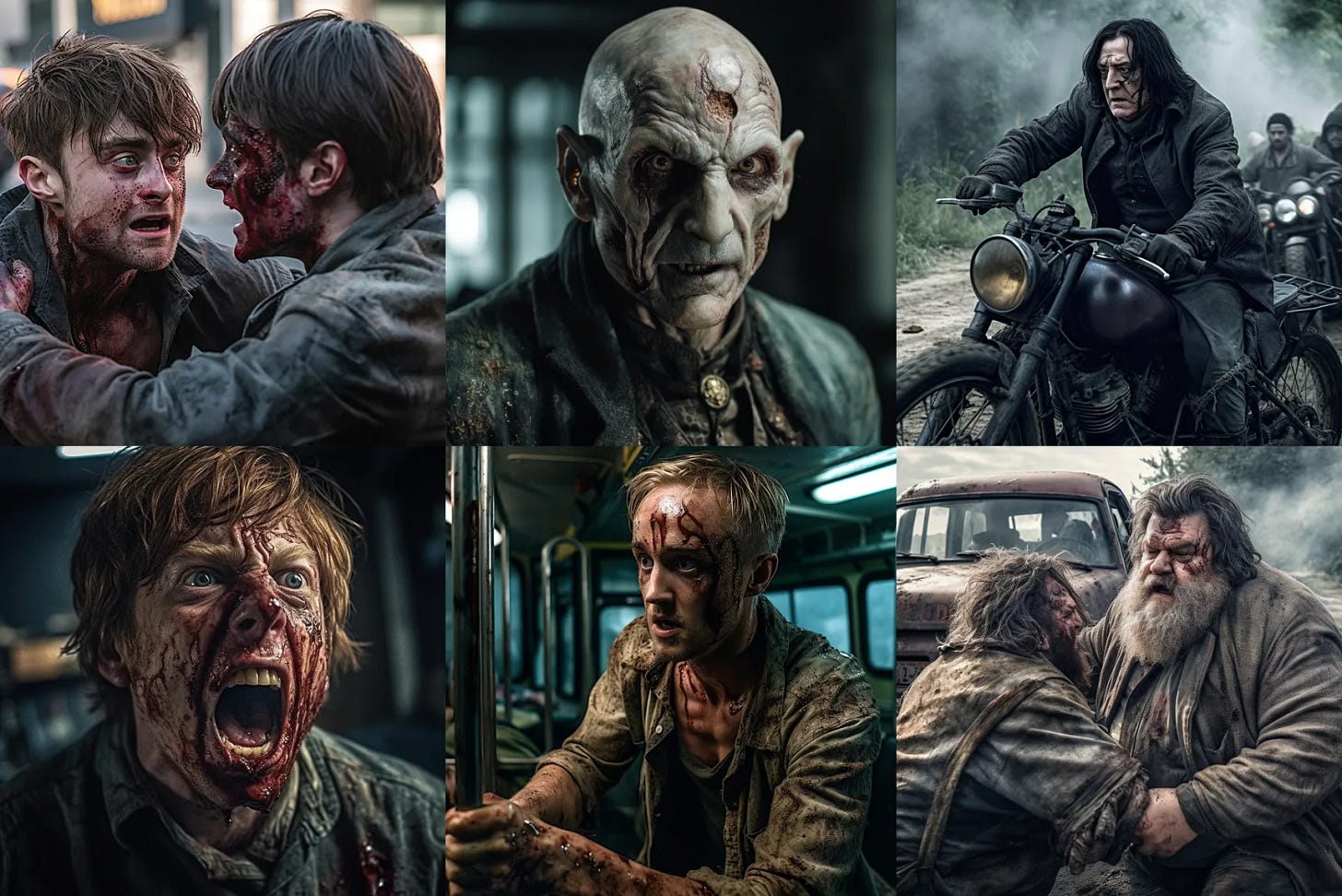
CUE “THE WILLIAM TELL OVERTURE”
Hughes is not ready to despair. Neither is the WGA, which has drawn a line in the sand when it comes to AI, making it the first American union to confront the threat of the technology to its membership, but also other arts industries and industries across the country that will soon find themselves replaced.
Let's be clear here: this is far from just something that threatens some smarty-pants, know-it-all liberal filmmakers in Hollywood as Fox News and Far Right "thinkers" on social media might have you think. AI will eliminate tens of millions of jobs — jobs that belong to both liberals and conservatives — and decimate the world economy in the process if people don't begin to act now. That's why you need to pay attention to this strike, even if you're not a screen/TV writer, even if you loathe everything Hollywood represents.
Because AI is coming for you and everyone you care about, too.
Paul Kedrosky, an investor and prominent AI thinker, told VANITY FAIR this week, “The writers strike is too easily dismissed as coastal elites protecting their cushy gigs. Instead it should be seen as the first skirmish in a new war, one where more than half of all jobs are at risk as we lose control of language itself—and thus of being human—to large language models.”
“There's a lot of societal anxiety about whether or not AI will be used to replace human workers,” Kim Shumway said in our e-conversation. “It's understandable. New technologies can create new efficiencies, and I think we've all learned that in today's world ‘efficiencies’ is code for ‘layoffs’. What makes Hollywood distinct is that it's a highly-unionized industry. This means we have a chance through collective bargaining, to define how AI can be used in our profession.”
Damon Lindelof agrees. “I’m not so naive as to ignore the fact that Pandora’s Box is already open here, but we still get to choose how open it is,” he told me.
This is why the WGA is taking the fight directly to their employers, rather than wait for the courts to come to our rescue. AI is one of the key reasons we have decided to strike at this moment in time and is, I at least would argue, the most important demand we have made of the AMPTP. It's the red line. And the fact that the AMPTP is refusing to even seriously discuss the subject — except to mockingly suggest they'll talk about it some more in one year — tells us everything we need to know about what they know is on the line for them…but also, industries outside of Hollywood.
Shumway believes the WGA strike is a test case for how AI can be positively integrated into the workforce. “My hope is that AI can become a tool used by writers, rather than a poor replacement for them. If we can blaze that trail, we can hopefully show other industries that this new technology can be used to empower individual workers and, in so doing, can improve things for everyone.”
HOW IT ALL ENDS
Let me be utterly clear: the threat of AI to WGA writers is not approaching. It’s here. It’s now. If we pass up this opportunity to preserve ourselves, it’s game over. There’s no second chance. All that will remain is a hellscape reigned over by tech companies peddling personal holodecks that feed upon human culture rather than producing any of its own. The damage will spread across other industries, too, and while we can’t prevent it, we can still control it if we act now.
“There is no point in speculating what will happen if we give in on this issue because we're not going to give in on this issue,” according to Billy Ray. “This is not a strike about corporate greed. It’s a strike about extinction.”
Hughes was more poetic when I asked him how this strike might end. “Isaac Asimov once said, ‘I write for the same reason I breathe — because if I didn't, I would die.’ Well, if the studios get their way, they’re going to smother us all with AI, and as we gasp our last breath as professional writers, we’ll watch the Guild as we know it come to an end…not with a bang, but with a simple prompt. And that’s why we fight, and that’s why we we’ll fucking win.”
You can read more about the WGA strike here:
The WGA Is on Strike — Here’s Why We’ll Win
The Secret Weapon Helping the Writers Guild Win This Strike
The WGA Strike in Photographs: A 'People's History' by J.W. Hendricks
The Tragedy of Howard Rodman Sr. (or: Why the Writers Guild Is on Strike)
A Matter of Survival: How the WGA Is Trying to Save Feature Screenwriters
If this article added anything to your life, please consider buying me a coffee so I can keep this newsletter free for everyone.
PSALMS FOR THE END OF THE WORLD is now available from Headline Books, Hachette Australia, and more. Paperback will hit shelves on May 25th. You can order it here no matter where you are in the world:




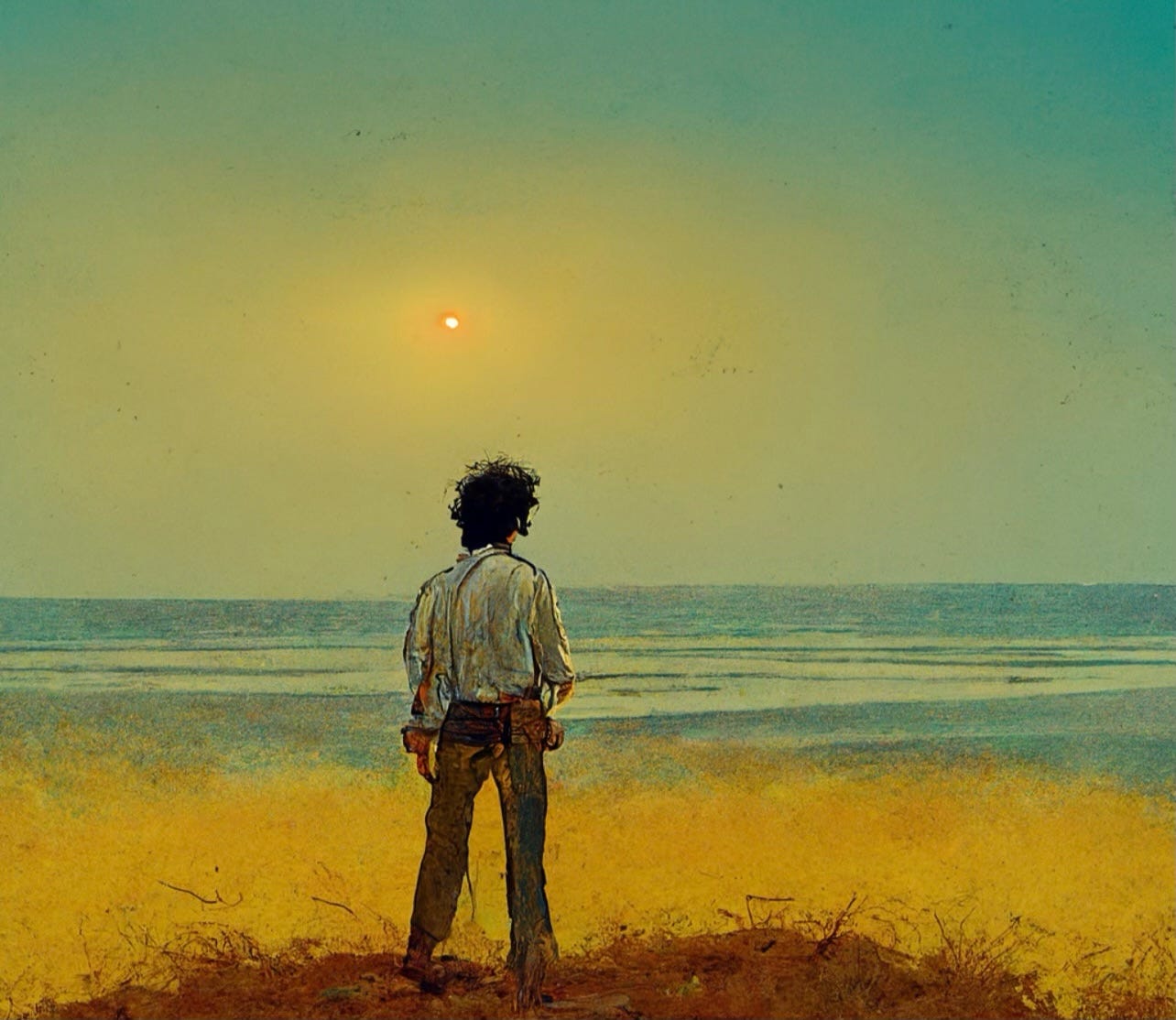
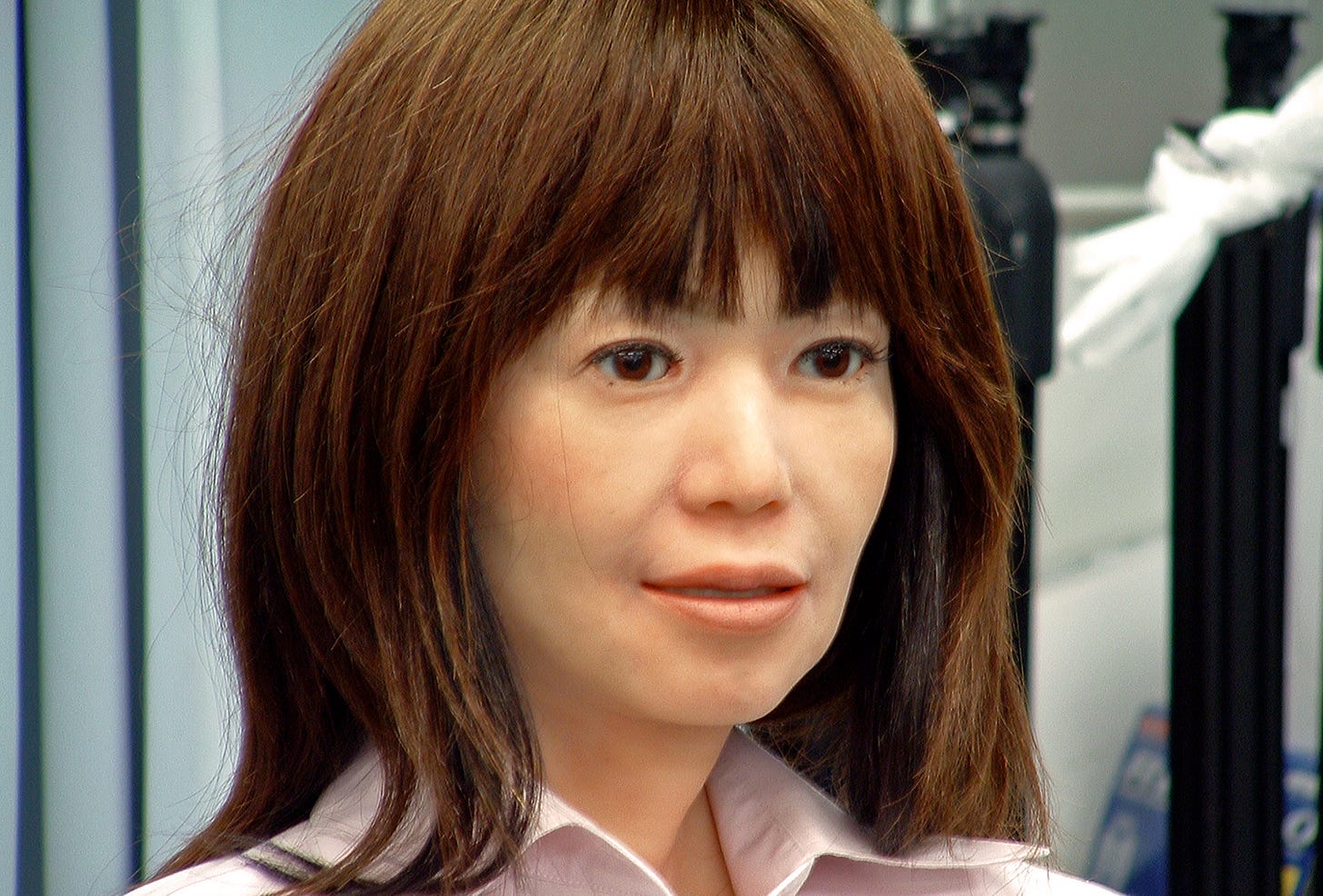
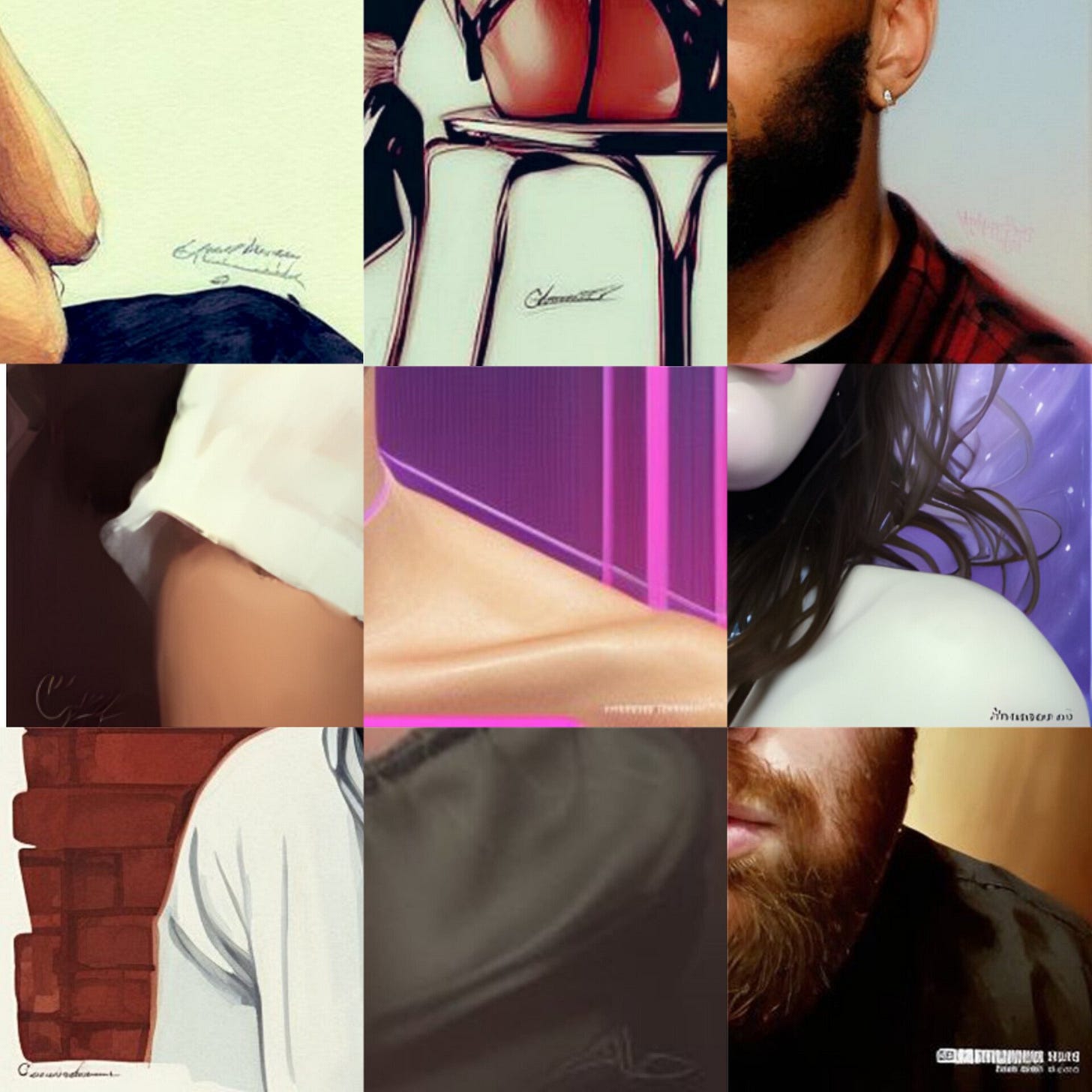

SAG-AFTRA prepares generative AI GPU server farm deal proposal to strike out on its own! 😂 Billion dollar IPO in the works, Bizney might provide seed capital to leapfrog competitors!
https://twitter.com/fablesimulation/status/1681352904152850437?t=fpYZ9SVUCKmEPUXQLs_gCA&s=19